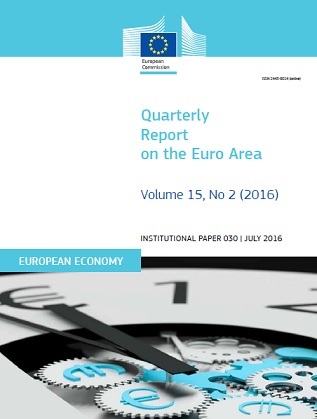Grigorian, David A., Manole, Vlad, (2016), “Sovereign Risk and Deposit Dynamics : Evidence from Europe”, IMF Publications, Working Paper No. 16/145, 22 July The unprecedented expansion of sovereign balance sheets since the global financial crisis has given a new meaning to the term sovereign risk. Developments in Europe since early 2010 presented new challenges for the functioning of private banks in an environment of heightened sovereign risk. This paper uses an …Read More
Back in work, still out of pocket: Labour market recovery since the Great Recession
Scarpetta, Stefano, Keese, Mark, Swaim, Paul, (2016), “Back in work, still out of pocket: Labour market recovery since the Great Recession”, Voxeu, 25 July The labour market recovery in OECD countries has been steady but slow since the Great Recession. More worrying is the fate of wage growth over the same period. This column assesses the implications of stagnation in the labour market for growth, wages, and inequality. It finds that …Read More
The European Union In Crisis – Is Flexible Integration The Way Forward?
Seikel, Daniel, (2016), “The European Union In Crisis – Is Flexible Integration The Way Forward?”, Social Europe, 22 July The UK’s Brexit referendum is the latest and most eminent manifestation of the European Union’s severe crisis of legitimacy. An ever-increasing number of Europeans fundamentally question European integration. Without legitimacy – i.e. the acceptance and support of the Europeans – the EU has no future. The right lesson to draw is that …Read More
How do regulated and unregulated labor markets respond to shocks? Evidence from immigrants during the Great Recession
Guriev, Sergei, Speciale, Biagio, Tuccio, Michele, (2016), “How do regulated and unregulated labor markets respond to shocks? Evidence from immigrants during the Great Recession”, Centre for Economic Policy Research, July We study wage adjustment during the recent crisis in regulated and unregulated labor markets in Italy. Using a unique dataset on immigrant workers, we show that before the crisis wages in the formal and informal sectors moved in parallel (with a …Read More
Fiscal Consolidation Under Imperfect Credibility
Lemoine, Matthieu, Lindé, Jesper, (2016), “Fiscal Consolidation Under Imperfect Credibility”, Centre for Economic Policy Research, July This paper examines the effects of expenditure-based fiscal consolidation when credibility as to whether the cuts will be long-lasting is imperfect. We contrast the impact limited credibility has when the consolidating country has the means to tailor monetary policy to its own needs, with the impact when the country is a small member of a …Read More
Secular stagnation in the open economies: How it spreads, how it can be cured
Eggertsson, Gauti B, Summers, Lawrence H., (2016), “Secular stagnation in the open economies: How it spreads, how it can be cured”, Voxeu, 22 July The secular stagnation hypothesis suggests that low interest rates may be the new normal in years to come. This column argues that this prospect should not only lead to a major rethinking of policy from the perspective of individual economies, but also a major rethinking about monetary …Read More
Quarterly Report on the Euro Area
European Commission, (2016), “Quarterly Report on the Euro Area”, Vol.15, No.2, Institutional Paper 030, July According to the European Commission’s latest forecast, published in May 2016, the economic recovery in the euro area is expected to continue at a fairly modest pace, especially when compared with precrisis standards. Underwhelming growth is mainly supported by internal demand and some tailwinds, in particular very accommodative monetary policies, supportive fiscal policies, low oil prices …Read More
The impact of the crisis on fiscal convergence in the EU: the early signs
Censoloa, Roberto, Colombo, Caterina, (2016), “The impact of the crisis on fiscal convergence in the EU: the early signs”, Journal of European Integration, 29 Αpril This article investigates the early signs of the impact of the financial crisis on fiscal convergence within the EU. Over the 2004–2012 period, we offer a comprehensive picture of the convergence pattern by considering the key fiscal aggregates and the main economic and functional components of total …Read More
The Problem that Wasn’t: Coordination Failures in Sovereign Debt Restructurings
Bi, Ran, Chamon, Marcos, Zettelmeyer, Jeromin, (2016), “The Problem that Wasn’t: Coordination Failures in Sovereign Debt Restructurings”, IMF Economic Review, 28 June Contrary to widespread expectation, emerging market debt renegotiations in the era of bond finance have generally been quick and involved little litigation. This paper presents a model that rationalizes some of the initial fears and offers two interpretations for why they did not come true. First, when debt exchange offers …Read More
Creditor participation clauses: Making orderly sovereign debt restructuring feasible in the Eurozone
Andritzky, Jochen, Feld, Lars P, Schmidt, Christoph M, Schnabel, Isabel, Wieland, Volker, (2016), “Creditor participation clauses: Making orderly sovereign debt restructuring feasible in the Eurozone”, Voxeu, 21 July To make the no-bailout clause credible and to enhance the effectiveness of crisis assistance, private creditors should contribute to crisis resolution in the Eurozone. This column proposes a mechanism to allow for orderly restructuring of sovereign debt as part of ESM programmes. If debt exceeds certain thresholds, …Read More





